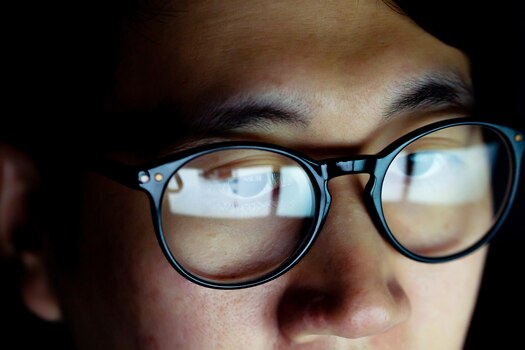Blue light glasses: Are they just a white lie?

Photo webmd.com
Man wearing blue light glasses
Screens. We stare at them every day. When we wake up, when we’re bored, when we want news, when we have school, and when we want to talk to our friends. All day. Every day.
Judging by how often we stare into screens, we would assume that there are no negative consequences. However, this may not be entirely true.
Most screens emit a type of artificial light called blue light, which is potentially harmful to humans. Studies have shown that it has both short-term, and in some cases, long-term effects.
According to preventblindness.org, excessive exposure to artificial blue light can cause digital eye strain, cause the eyes to age at a faster rate and in extreme cases cause retina damage. As screens increasingly become a part of our daily lives, we should be aware of the consequences.
Blue light glasses were created in an attempt to stop or lessen the effects of excessive blue light exposure. They are said to block or filter blue light from digital screens because of special lenses that absorb blue light. They typically look like average glasses, and the only difference is the lenses.
WHS junior Aidan McLane said, “I wear blue light glasses because it really takes stress off of my eyes while doing my homework. I noticed improvements in my sleep after wearing them, and they reduce the amount of headaches I get.”
McLane is not alone in his support for these newly popular glasses. Sales of blue light glasses have only been increasing since they were invented, and there does not seem to be a change coming soon.
But, the product still has its critics. A report done by the American Academy of Ophthalmology report said, “It’s not necessary to spend money on special [eyewear] for computer use. … We don’t really have any data that supports blue-blocking glasses as being better for your eyes when you’re using a computer.”
Although this product seems like a good idea, I don’t believe the technology is sophisticated enough to do what it says it does. For what the glasses promise to do, there would need to be much more than just a cheap lens added on to a regular glasses frame in order for it to work. Since screens will be used even more in the future, people must find a way to combat how much artificial blue light their eyes are exposed to.
As for why people notice benefits when they wear these blue light glasses, the problems may just be in their heads, and the only reason they notice immediate benefits is that they want to believe that the glasses help them. This is why people claim to feel better with the glasses, even though research suggests that it has no real effects.
Only time will tell whether or not these glasses are truly beneficial for the human eye, or if they are just another gimmick created by a company to make money.

Global Eyes • Jun 21, 2022 at 3:08 am
Great guide! I like the info provided by you about glasses frames. niceBlue light Glasses